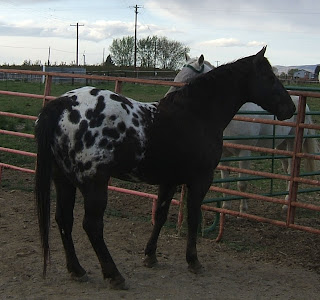
The Zoonotic Disease Program received notification from Washington Animal Disease Diagnostic Laboratory
and Washington State Department of Agriculture that 4 more horses tested positive for West Nile virus.
This remains confidential until further details are received.
Yakima County :: Non-vaccinated, 10-year-old mare quarter horse :: Granger :: Pregnant and recovering
Yakima County :: Non-vaccinated, 17-year-old thoroughbred gelding :: Selah :: Euthanized
Yakima County :: Non-vaccinated, 26-year-old Arabian mare :: Selah :: Recovering
Yakima County :: Non-vaccinated, 19-year-old quarter horse gelding :: Selah :: Recovering
As of September 26, a total of 33 horses, 9 birds, and 41 mosquito samples tested positive for West Nile virus.
There will be no press release at this time.
Jo Marie Brauner
West Nile Virus Surveillance Coordinator
Washington State Department of Health
Zoonotic Disease Program
PO Box 47825
Olympia, WA 98504-7825
Desk: 360-236-3064
Fax: 360-236-2261
West Nile Virus and Horses
Q. Has West Nile virus caused severe illness or death in horses?A. Yes, while data suggest that most horses infected with West Nile virus recover, results of investigations indicate that West Nile virus has caused deaths in horses in the United States.
Q. How do the horses become infected with West Nile virus?A. The same way humans become infected—by the bite of infectious mosquitoes. The virus is located in the mosquito's salivary glands. When mosquitoes bite or "feed" on the horse, the virus is injected into its blood system. The virus then multiplies and may cause illness. The mosquitoes become infected when they feed on infected birds or other animals.
Q. How does the virus cause severe illness or death in horses?A. Following transmission by an infected mosquito, West Nile virus multiplies in the horse's blood system, crosses the blood brain barrier, and infects the brain. The virus interferes with normal central nervous system functioning and causes inflammation of the brain.
Q. Can I get infected with West Nile virus by caring for an infected horse?A. West Nile virus is transmitted by infectious mosquitoes. There is no documented evidence of person-to-person or animal-to-person transmission of West Nile virus. Normal veterinary infection control precautions should be followed when caring for a horse suspected to have this or any viral infection.
Q. Can a horse infected with West Nile virus infect horses in neighboring stalls?A. No. There is no documented evidence that West Nile virus is transmitted between horses. However, horses with suspected West Nile virus should be isolated from mosquito bites, if at all possible.
Q. My horse is vaccinated against eastern equine encephalitis (EEE), western equine encephalitis (WEE), and Venezuelan equine encephalitis (VEE). Will these vaccines protect my horse against West Nile virus infection?A. No. EEE, WEE, and VEE belong to another family of viruses for which there is no cross-protection.
Q. Can I vaccinate my horse against West Nile virus infection?A. A West Nile virus vaccine for horses is available through veterinarians. Horse owners throughout the US should consider vaccinating their equines. Consult your veterinarian for more details on timing of vaccination.
Q. How long will a horse infected with West Nile virus be infectious?A. We do not know if an infected horse can be infectious (i.e., cause mosquitoes feeding on it to become infected). However, previously published data suggest that the virus is detectable in the blood for only a few days.
Q. What is the treatment for a horse infected with West Nile virus? Should it be destroyed?A. There is no reason to destroy a horse just because it has been infected with West Nile virus. Data suggest that most horses recover from the infection. Treatment would be supportive and consistent with standard veterinary practices for animals infected with a viral agent.
Q. Where can I get more information on horses and West Nile virus?A. Visit the USDA Web site Animal and Plant Health Inspection Service (APHIS).


























 This is a picture of a horsefly, it is artfully perched on a flower for the photographer. Hard to believe that something that looks kind of cute in a photo can bite so hard and be such a pest.
This is a picture of a horsefly, it is artfully perched on a flower for the photographer. Hard to believe that something that looks kind of cute in a photo can bite so hard and be such a pest. 





















